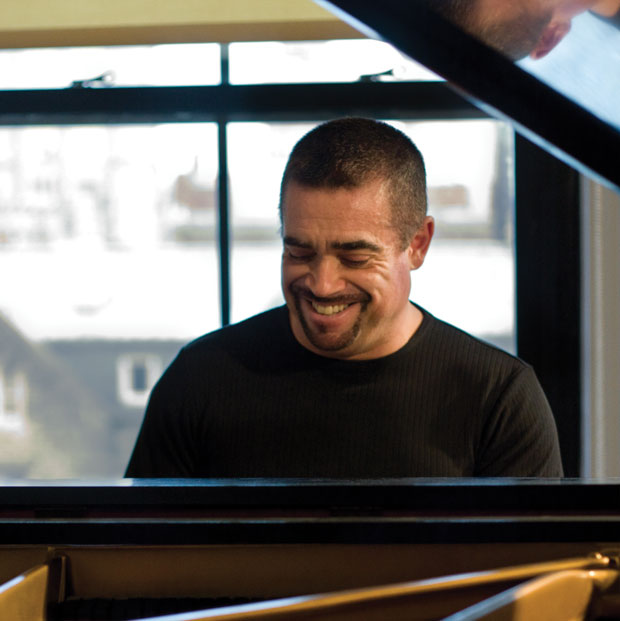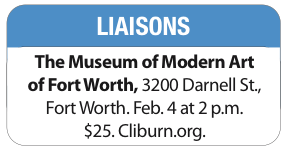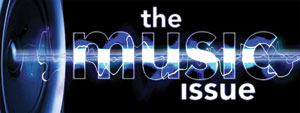Sexy gay pianist Anthony de Mare’s love of showtunes spurred his experimental concert tour inspired by the music of Stephen Sondheim

I’M STILL DE MARE | The gay pianist and showtune addict will tackle Sondheim at his Cliburn Concert.
GREGORY SULLIVAN ISAACS | Contributing Writer
gregoryisaacs@theaterjones.com
Dark, handsome and obviously buff, Anthony de Mare’s charm oozes out of his publicity photos. Smiling at you from behind his piano, he seems to have just said “Hello” and is waiting for you to answer.
Wishful thinking, at best. De Mare is happily partnered to Tom Spain, a publishing executive; they live in the Chelsea neighborhood of New York with their Pomeranian, Cowboy. (“He is actually a very large dog, for a Pom,” says de Mare with a laugh.)
It’s unlikely he’d have time for you anyway. De Mare is in the middle of an ambitious concert project that started in Canada last spring and has already taken him to New York City, Chicago and more. On Saturday, he’ll play that concert, Liaisons: Re-imagining Sondheim for the Piano, at the Modern Art Museum in Fort Worth as part of the Cliburn Concerts Series.
The concert is a natural fit for de Mare, acclaimed as an interpreter of contemporary music. In fact, if was his idea.
 Already a big showtune fan, de Mare organized this project, which enlisted 36 composers to create short, solo piano pieces based on the music of Stephen Sondheim — not arrangements, mind you, but original compositions that use a Sondheim song as a cantus firmus. It’s the fulfillment of a concept that has been brewing in him since childhood.
Already a big showtune fan, de Mare organized this project, which enlisted 36 composers to create short, solo piano pieces based on the music of Stephen Sondheim — not arrangements, mind you, but original compositions that use a Sondheim song as a cantus firmus. It’s the fulfillment of a concept that has been brewing in him since childhood.
“I was always a fan of Sondheim,” he says. “I trained as a dancer and pianist and always felt at home in theater. Besides, it was one of the best ways I could think of to be able to play this music in concerts.”
The concert ends up being something of a showcase for gay musicians. In addition to de Mare and Sondheim, among the participating composers who are openly gay are Ricky Ian Gordon, Eve Beglarian, Fred Hersch, Nico Muhly, Eric Rockwell, Rodney Sharman and Jake Heggie. “And there are a couple of others I am not so sure about,” he adds with a chuckle.
De Mare left the parameters open for the composers, giving them as much freedom as they needed. But he did have some policies about what he wanted to play.
“I didn’t really want any of the songs to be deconstructed, making them unrecognizable,” he says. “I told them to maintain the melodic material even if it is a loose reference to the song. I also asked them to make the pieces no shorter than three to four minutes, and no longer than eight or ten.” (Most run four to eight minutes.)
That may sound like an easy assignment, but it wasn’t.
“Many of the composers told me this turned out to be a very challenging assignment because the songs are so perfect just as they are,” he says. “It is hard to do something original without doing something completely different.”
For example, minimalist composer Steve Reich tackled “Finishing the Hat” from Sunday in the Park with George. “You know right off the bat that it is Reich, but the melodic material is still there,” he says. “David Rakowski had only one song in mind, ‘The Ladies who Lunch’ from Company. It was not originally on my list, though it is one of my favorite songs from the show. It is so character driven I didn’t think it would work as a piano solo. But he brought it to life brilliantly with all its bitterness and core of disappointment — he gets there without the lyrics.”
The program at the Modern will be held in the intimate lecture hall at the museum — an ideal venue for a piano recital. Shields-Collins “Buddy” Bray, a fine pianist himself, will serve as moderator, initiating a discussion about the pieces. De Mare will play about 13 of the 36 musical meditations commissioned, but even he isn’t quire sure which ones.
“I am still deciding,” he says.
I vote for “I’m Still Here.”
This article appeared in the Dallas Voice print edition February 3, 2012.
















